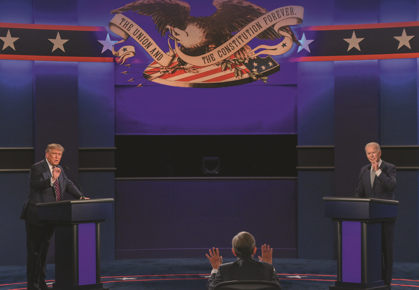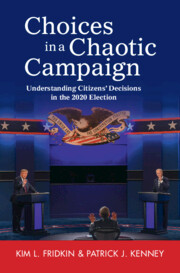
A few weeks ago on May 15, President Joe Biden and former President Donald Trump agreed to at least two general election debates: one on June 27, 2024 and one on September 10, 2024. The first debate will be hosted by CNN and moderated by Jake Tapper and Dana Bash, with no audience present at the debate. This will be the earliest presidential debate held in the modern era of television. Typically, these presidential debates are held in the fall of the election year. This will also be the first presidential debate since 1988 where negotiations regarding details and specifics of the debate will not be overseen by the Commission on Presidential Debates (CPD). For example, there are no details yet on format of the debate (e.g., will candidates present opening statements, how long will the debate last, will candidates sit or stand). The CPD has sponsored and produced multiple debates per election across nine consecutive elections.
Presidential debates are considered potentially powerful campaign events since they expose voters to presidential candidates directly and unmediated for a sustained amount of time, usually 90 minutes to two hours. Furthermore, the news media, after the debate, focus extensively on the rival candidates’ performances, their policy stands, their personalities and their gaffes. The academic literature regarding the influence of debates and related news coverage suggests debates can influence how candidates are perceived and the effects, although typically short-term, can be important since debates occur traditionally less than two months before Election Day.
The history of contemporary presidential debates provides insightful anecdotes about the role debates play in shaping citizens’ attitudes about the competing candidates. The first televised presidential debate in 1960 featured John F. Kennedy and Richard Nixon where Kennedy’s tan and healthy image contrasted dramatically to Nixon looking tired, with a five o’clock shadow and a pallid complexion (Nixon was recovering from the flu). Although debate folklore suggests people watching on television thought Kennedy had won the debate and people listening on the radio thought Nixon was the winner, there is scant evidence to support this contention. The next set of presidential debates did not take place until 1976. In the second debate in October of 1976, Ford answered a question about the Helsinki Accords (signed a year earlier in the midst of the Cold War) by saying, “There is no Soviet domination of Eastern Europe and there never will be under a Ford administration.”
This response, along with a follow-up question from the moderator, was widely considered a significant gaffe. Polling data by a GOP pollster suggested Ford’s gaffe may have stalled his resurgence in public opinion polls during the summer of 1976, potentially contributing to his loss in November. Another example of a consequential debate moment occurred during the last debate between incumbent president George W. Bush and Democratic challenger John Kerry in 2004. The moderator, Bob Schieffer, asked both candidates, “Do you believe homosexuality is a choice?” Senator Kerry answered the question by saying, “We’re all God’s children, Bob. And I think if you were to talk to [Vice President] Dick Cheney’s daughter, who is a lesbian, she would tell you that she’s being who she was, she’s being who she was born as.” Post-debate coverage of the debate focused intensely and negatively on Kerry mentioning the younger Cheney’s sexuality. Research examining the debate, and post-debate coverage, suggested the news media’s spin in the 24 hours following the 2004 debate persuaded potential voters to change their views about the rival candidates, especially their evaluations of John Kerry.
In Choices in a Chaotic Campaign: Understanding Citizens’ Decisions in the 2020 Election, we examined the impact of the first 2020 presidential debate in September 2020. We asked respondents in the beginning of October who they believed won the debate. Among the almost 1,800 respondents, 52% of the respondents said Biden won the debate, 31% indicated Trump was the winner, with 17% of the respondents called the debate a tie between the candidates. We also asked respondents to rate the candidates’ debate performance on a scale from 1 to 10. Consistent with people’s views about who won the debate, people’s ratings of Joe Biden’s performance (5.88) were significantly higher than evaluations of Donald Trump’s debate performance (4.50).
Given the lopsided reaction to the presidential debate, we looked at whether assessments of the debate influenced changes in people’s overall evaluations of the candidates. Utilizing the panel design of our study, we had the luxury of talking to the same people more than once during the fall campaign, allowing us to examine changes in attitudes. The debate was consequential; people’s assessment of the candidates’ performance in the debate strongly predicted changes in feelings towards both candidates. Finally, we looked at whether people’s reactions to the first 2020 presidential debate changed people’s vote preference. We found, as people’s assessments of Trump’s performance in the debate became more negative, these individuals were significantly more likely to change their vote intention from voting for Trump in September to voting for Biden in October.
In comparison, people’s assessments of Biden’s performance were less influential and did not significantly alter changes in vote preference during this period. Furthermore, the impact of views about Trump’s September debate performance persisted until Election Day, significantly affecting changes in vote preference from September to November. Our examination of the 2020 September debate validates the importance of presidential debates. Especially if a debate is considered a lopsided affair, the winning candidate can reap significant electoral benefits, while the losing candidate will face lower evaluations and potentially less support at the polls. The first debate in the 2020 general election illustrates the power of campaign events.
Looking ahead to the upcoming 2024 debates, even though the candidates are the same, there are significant differences between the 2020 and upcoming 2024 debates. To begin, the first 2024 debate is occurring before both parties nominating conventions, four full months before Election Day and nearly three months before most states begin mail-in voting. Presidential debates in the TV era have never preceded the nominating conventions. Second, there are approximately two-and-a-half months between the first and second debate. Typically, debates are separated by a few weeks. Given the length of time between the two debates, the impact of an uneven performance in the first debate may endure longer than in previous cycles. Third, former President Trump has been convicted of 34 felony charges stemming from the recent criminal trial in Manhattan, NY.
This is a first for candidates heading into a presidential debate and Trump is likely to face questions by the moderators (and perhaps by his opponent) on the topic of his criminal convictions. Fourth, the candidates have traded places, the incumbent president from 2020 is now the challenger and the challenger from 2020 is now the incumbent president. Once again, this has never happened in the era of televised debates. Therefore, we remain uncertain about how incumbency will alter the impact of the debate on potential voters. Regardless – or perhaps because of these significant differences– we believe the upcoming debates have the potential to alter the trajectory of the historic campaign. In a matter of weeks, we will have a better picture of whether the first debate of the campaign season will play a key role in the attitudes and actions of the Americans in the 2024 election.

Latest Comments
Have your say!